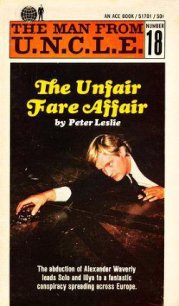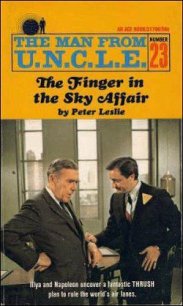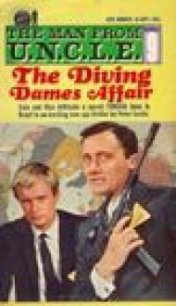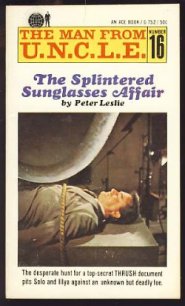The Radioactive Camel Affair - Leslie Peter (е книги txt) 📗
At this moment the call sign on Illya’s transceiver began sounding insistently.
“What’s that?” Ononu demanded suspiciously.
“A transistor radio,” Kuryakin said innocently. “I must have left it on…”
“Give it to me.”
“But it’s my personal property!”
“There’s no personal property in a war, man,” the colonel exclaimed, dragging off his beret and slapping his thigh with it. “When will you Europeans realize that this is Africa? Give it to me, I say.”
As one of the ring of soldiers surrounding them moved a step forwards, jerking up the barrel of his automatic rifle, the agent drew the radio reluctantly from his pocket and handed it over. Ononu dropped the red beret back on his head and examined the compact device, turning it over and over in his hands. As the bleeping continued, a hot, dry wind stirred eddies in the dust at their feet and agitated the stiletto-like spikes of the thorn trees.
“But this is not a music radio,” the colonel said at last. “This is a talking radio. Somebody is talking to you, calling you. Who?”
“My partner.”
“Partner? What is his name? Where is he?”
“His name is Waverly,” Illya said easily. “He is supposed to be somewhere up in the forest area already. He is probably calling me to say that he has found a suitable place for photographs.”
“Answer him, then.”
The Russian took back the radio and turned the pointer to TRANSMIT. “Hello, Waverly,” he said, his mouth close to the microphone grille; “this is Kuryakin. Hello, Waverly—come in please…Hello, Waverly…”
He turned the pointer back to RECEIVE. But only the bleeping continued. No voice answered from the tiny speaker—which was not surprising, for he had kept his thumb firmly on a small button at the side of the casing. Unless the button was released, the radio would not transmit.
“Try again,” Ononu ordered.
Illya repeated the charade. And again the high-pitched pips provided his only reply. After a time they ceased.
“Something must be wrong with it,” Kuryakin said; shaking the set vaguely.
“I will take charge of it,” the colonel said, holding out his hand.
“But it will be of no use to you. It cannot be tuned to different wavelengths: you can only use it in conjunction with similar sets which have been synchronized with it. It is useless by itself.”
“Radios are always useful in guerrilla warfare.”
“But I tell you it is useless to you. Besides, it is broken.”
“Then you will not be inconvenienced by the lack of it.”
Ononu took the transceiver and put it in his own pocket. He said, “I have decided to permit you to proceed and seek your friend—but only because of what you told me earlier: that you had received General Mazzari’s personal accord. This will be checked—and I must warn you that if it should prove to be untrue you will regret it.”
“It is true.”
“Good. Then, apart from one small formality, I need not detain you further. As underground forces, you understand, we must not remain too long in the same place. More normally, we keep to the mountains—however, the day is at hand. The Nya Nyerere will soon be marching openly, the acknowledged force for law and order in the land.”
“And the formality?”
“We must search your effects, lest there might be something dangerous to us—or of use to us.”
Illya shrugged angrily and gestured towards the Landrover. He stood fuming in the searing sunlight, sweat plastering his hair to his forehead, as the soldiers expertly unrolled his baggage and handed up the contents to be examined by Ononu. The mercurial colonel “requisitioned”—as Kuryakin had feared—the collapsible U.N.C.L.E. gun and its ammunition. He also took a parcel of miniature grenades, a bundle of phosphorus lockdestroyers, a rifle with a telescopic sight, and a pair of homing devices in a case, similar to those used by Solo.
“You appear, Mr. Kuryakin, to anticipate some hostile reaction from your subjects,” he said dryly.
“The area is far from any human habitation and practically unexplored, as I said. One has to prepare for anything.”
“You will be able to move the better without the excess weight—for you will be unable to take your car the whole way, you know. It is a rare thing to see a vehicle at all in these parts. Which being so, we will relieve you of one of these also.” He motioned one of his men to take out one of a pair of 14-gallon drums filled with gasoline which were housed against the fiat back of the Landrover.
“But I shall not be able to replace them,” Illya expostulated. “The tank needs replenishing now—and I have perhaps two hundred miles to go. Plus at least another four hundred before I find a gas station on the return journey…”
“As I said, you will not be able to take your vehicle the whole way to the forest,” Ononu remarked smoothly. “The scarcity of gasoline now will ensure that you do not stray into regions where you have no business in your attempts to find alternative routes. Besides, you have the pleasure of knowing that you are advancing the Cause.”
Kuryakin raised his arms and let them drop helplessly by his sides. There was no point in arguing: there was nothing he could do; and if he provoked Ononu too much, the soldier was quite capable of taking the whole car and abandoning him in the wilderness. At least they had left him his field glasses and his three cameras—one of which was a dummy and fired eight .32 bullets in rapid succession from what appeared to be a range-finder. The cigarette-lighter pistol, with its sleep darts, remained in his trouser pocket, too.
After two and a quarter hours’ driving, he reached the fork where the roads for Wau and Halakaz diverged. There had once been a settlement at the junction, but all that remained now was the familiar patch of blackened and seared ground, pock-marked with the jagged stumps of walls. From a horizontal branch jutting out over the road, a scorched tree dangled the bodies of five hanged men—naked, decomposing, the eyes plucked out by vultures. Illya’s eyes narrowed grimly as he swung the Landrover around the grisly spectacle to take the right hand track towards Halakaz.
The scrub had given place to a mean variety of bushes and squat trees as the road had mounted. Now the trees thickened and the angle of incline grew more steep. Soon the Landrover was laboring in low gear up what appeared to be a channel carved in the solid bedrock. After several miles of this, the trail flattened out—although it grew no smoother—and Illya saw that he was crossing a plateau of bare volcanic rock surrounded on all sides by steep, sugar-loaf hills covered dense vegetation. The foliage was brownish-gray in color and could by no stretch of the imagination be termed rich; but it was a welcome change from the eternal monotony of the thorn tree desert. At least there must be some water about somewhere…
The Landrover had plunged into several valleys and climbed the steep slopes on the far side before Illya saw any, however. Then suddenly the trail, instead of ascending after it had crossed a dry riverbed, turned and followed the watercourse along a twisting defile which opened out into a wide, shallow valley four or five miles across. And in the middle of the valley a trickle of brown water flowed sluggishly in a deep wadi. Birds flapped in the air and a herd of deer-like creatures—there must have been several hundred of them—galloped off in a cloud of dust as the vehicle approached. They were the first living creatures Illya had seen since he had left Colonel Ononu and his detachment that morning. He stopped the car at the bottom of the wadi, replenished his radiator with some of the brackish water, and poured fuel from his remaining gasoline drum into the tank. Then, after eating some cold food from his pack, he drove on towards the hills on the far side of the valley.
The topography was different here—the slopes gentler, the vegetation lusher and more verdant. To balance this advantage was the fact that, among undergrowth, the trail was at times very difficult to find. Several times he had to stop, get out and search around for some time before he could identify the route.




![[The Girl From UNCLE 04] - The Cornish Pixie Affair - Leslie Peter (электронная книга .txt) 📗](/uploads/posts/books/56865/56865.jpg)